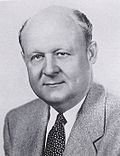November 2, 1948 | |||||||||||||||||
| |||||||||||||||||
 County results Peterson: 50–60% 60–70% 70–80% Sorrell: 50–60% 60–70% | |||||||||||||||||
| |||||||||||||||||
| Elections in Nebraska |
|---|
 |
The 1948 Nebraska gubernatorial election was held on November 2, 1948, and featured incumbent Governor Val Peterson, a Republican, defeating Democratic nominee, former state Senator Frank Sorrell, to win a second two-year term in office.

